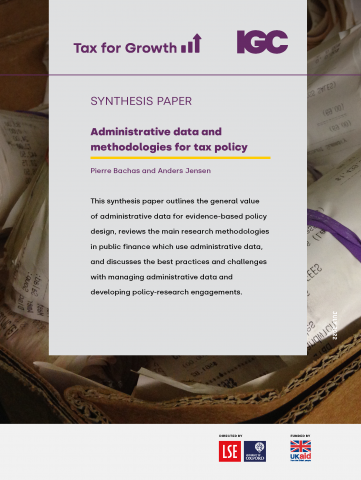Administrative data and methodologies for tax policy
This synthesis paper outlines the general value of administrative data for evidence-based policy design, reviews the main research methodologies in public finance which use administrative data, and discusses the best practices and challenges with managing administrative data and developing policy-research engagements.
-
Administrative data and methodologies for tax policy
PDF document • 27.68 MB
The growing literature on state capacity places the ability to collect taxes in an efficient and equitable manner at the heart of how state-building occurs along the development path (Besley and Persson 2013). Governments in developing countries are currently characterised by limited tax capacity — low level of taxes collected, in an inefficient manner, and with limited redistribution. Understanding which policies are effective in alleviating capacity constraints requires an evidence-based approach. Evidence-based policy design is an approach where rigorous methods and high-quality data are combined to identify the policy problems and its underlying failures and, in turn, evaluate policy solutions using experimental and quasiexperimental empirical designs.
In the context of taxation, the rise of evidence-based policy design in developing countries is closely related to the increased use of administrative data in research and policy analyses. Administrative data are the set of microeconomic datasets that governments continuously create for the administration of their tax and transfer programmes. In this review, we outline the general value of administrative data for evidence-based policy design, review the main methodologies in public finance which use administrative data, and discuss best-practices and challenges with managing administrative data and creating policy-research engagements.




